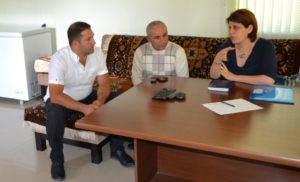
On September 27, the ASPIRED project conducted the training on environmental compliance, health and safety requirements in Hayanist village. The on the job training was intended for the representatives of the community, the fish-farm and the sub-contractor involved in construction of the pumping station and installation of pumps who were briefed on the environmental and safety requirements of USAID and the locally adopted construction norms.
Particularly, the ASPIRED Environmental Specialist discussed with the participants the potential environmental impacts of the construction and installation work currently taking place on the fish farm site, including measures for prevention of harmful their effects. The community and sub-contractor representatives were requested to observe the safety norms during implementation of construction activities and electric wiring work to avoid potential accidents.
Due to the specifics of the project, the potential negative environmental impact of the project is insignificant as there will be no major construction work. Small quantity of construction wastes will be stored and disposed properly to the designated landfill by the village. The soil excavated during the pipeline installation will be used for back-filling, and then properly graded and compacted. Additional training will be scheduled for the local companies to be sub-contracted for the trench-work and installation of pipeline.
The irrigation rehabilitation project is implemented with joint funding of the USAID ASPIRED Project, Coca-Cola HBC and Environmental Research and GIS Center NGO. The project is aimed at using the outlet water from the fish-farm located in the vicinity of Hayanist village for irrigation of the community land. The project will provide more affordable irrigation services for farmers of Hayanist community and result in improved living for about 120 households.
